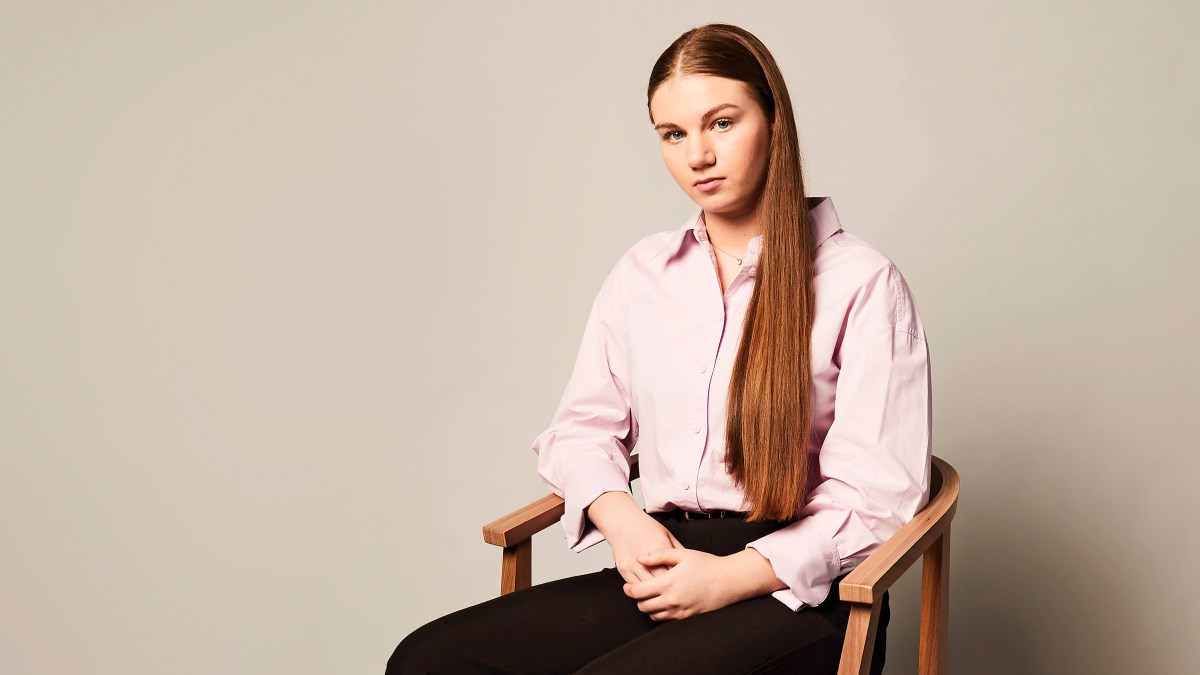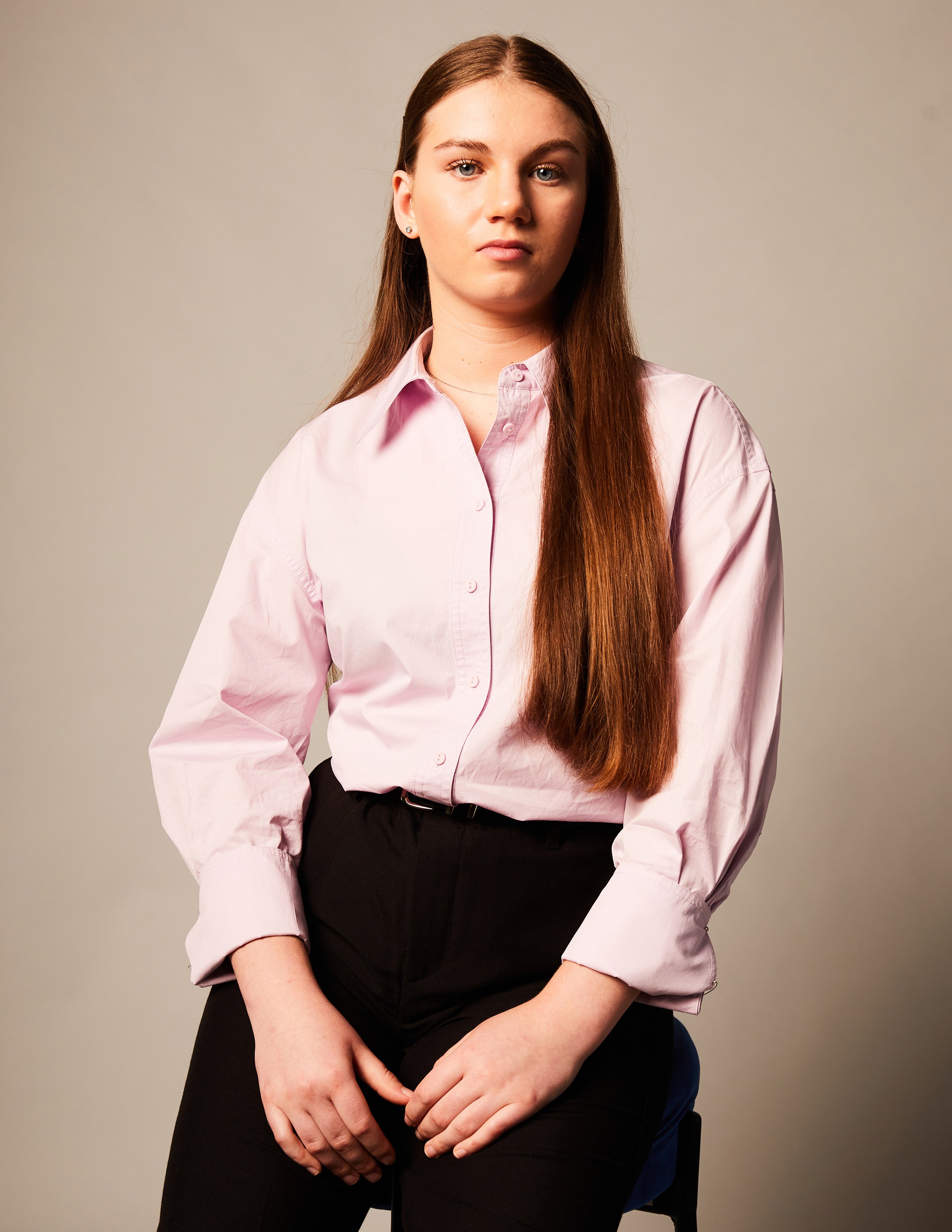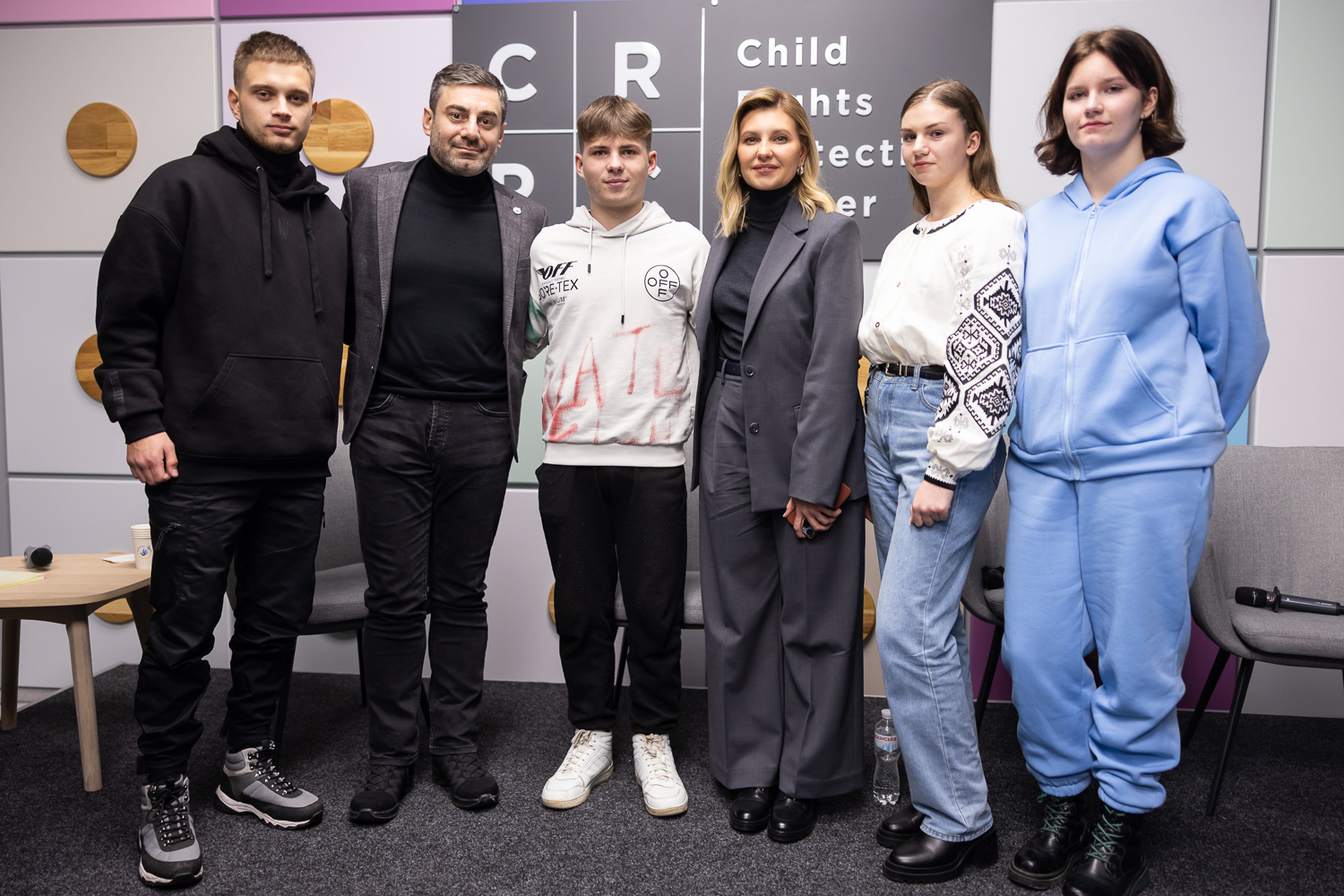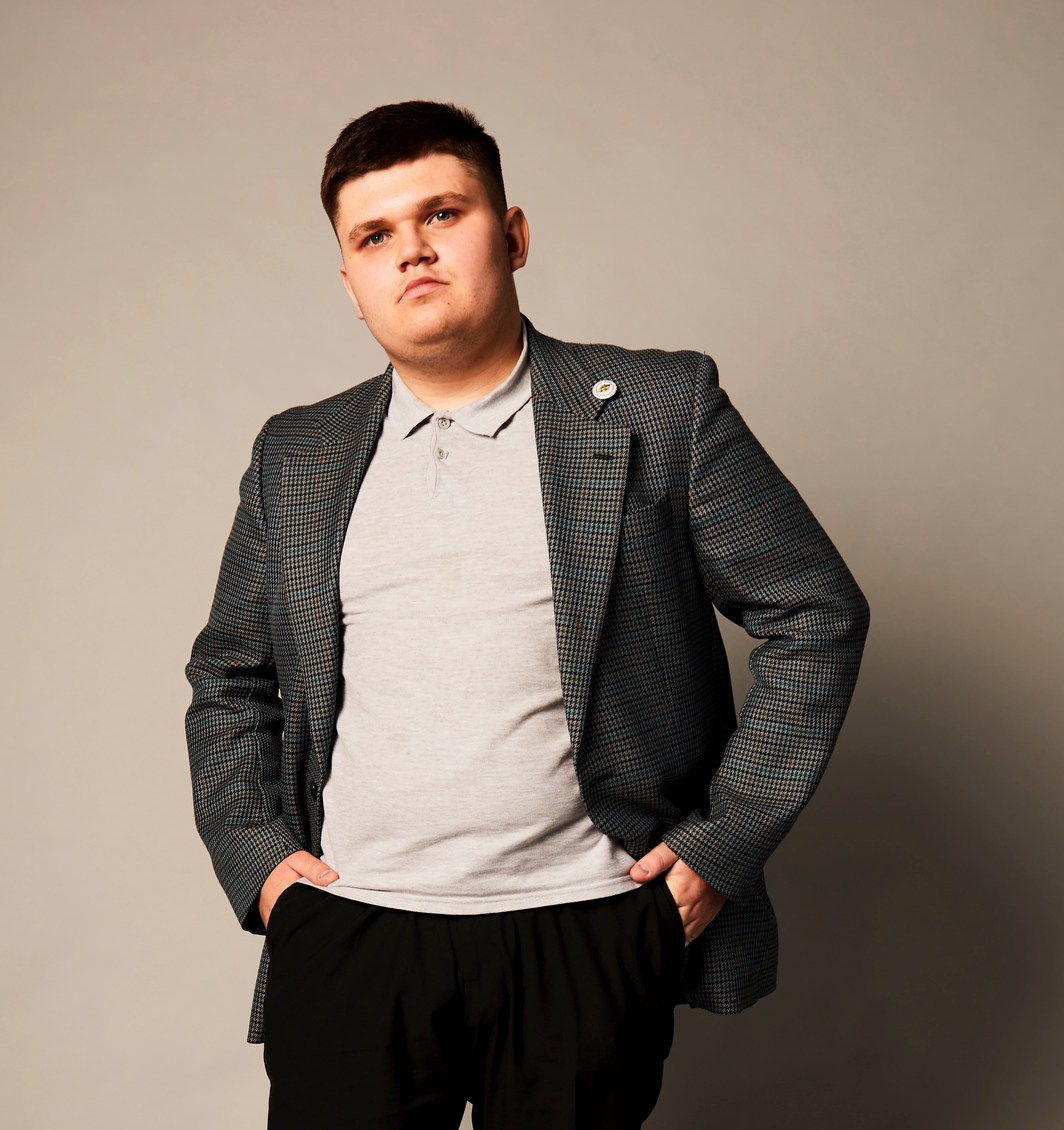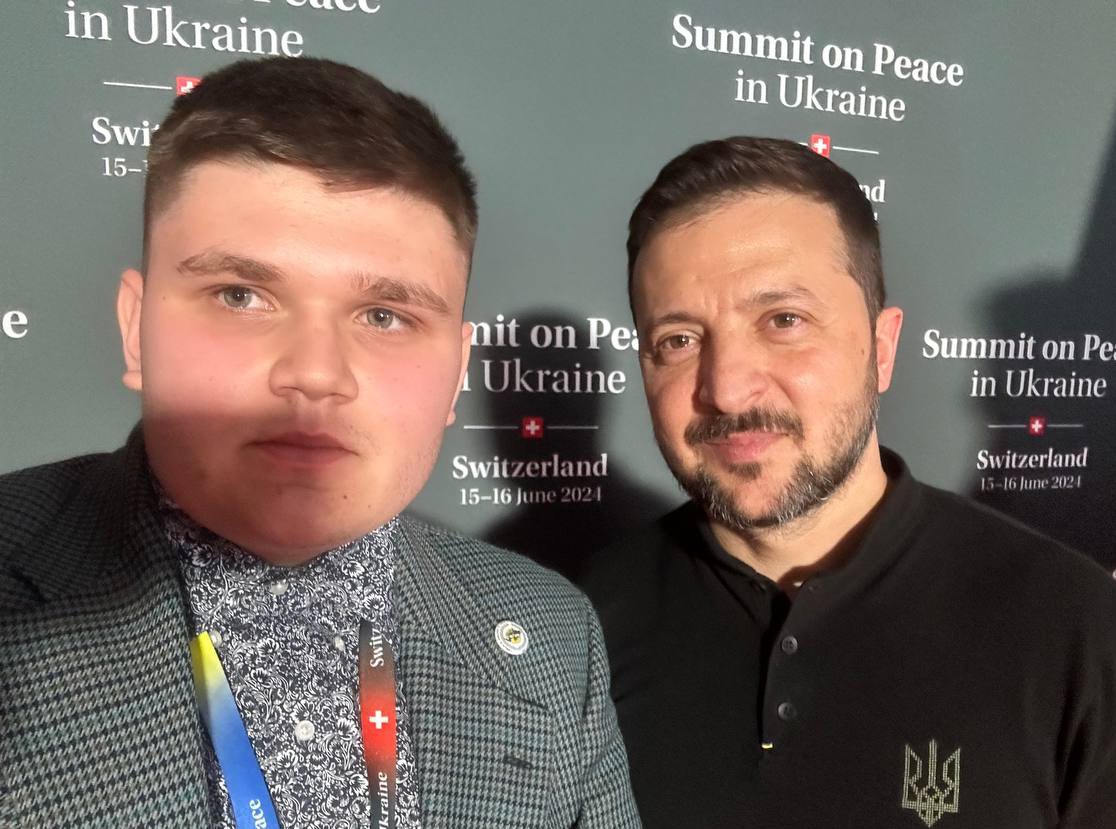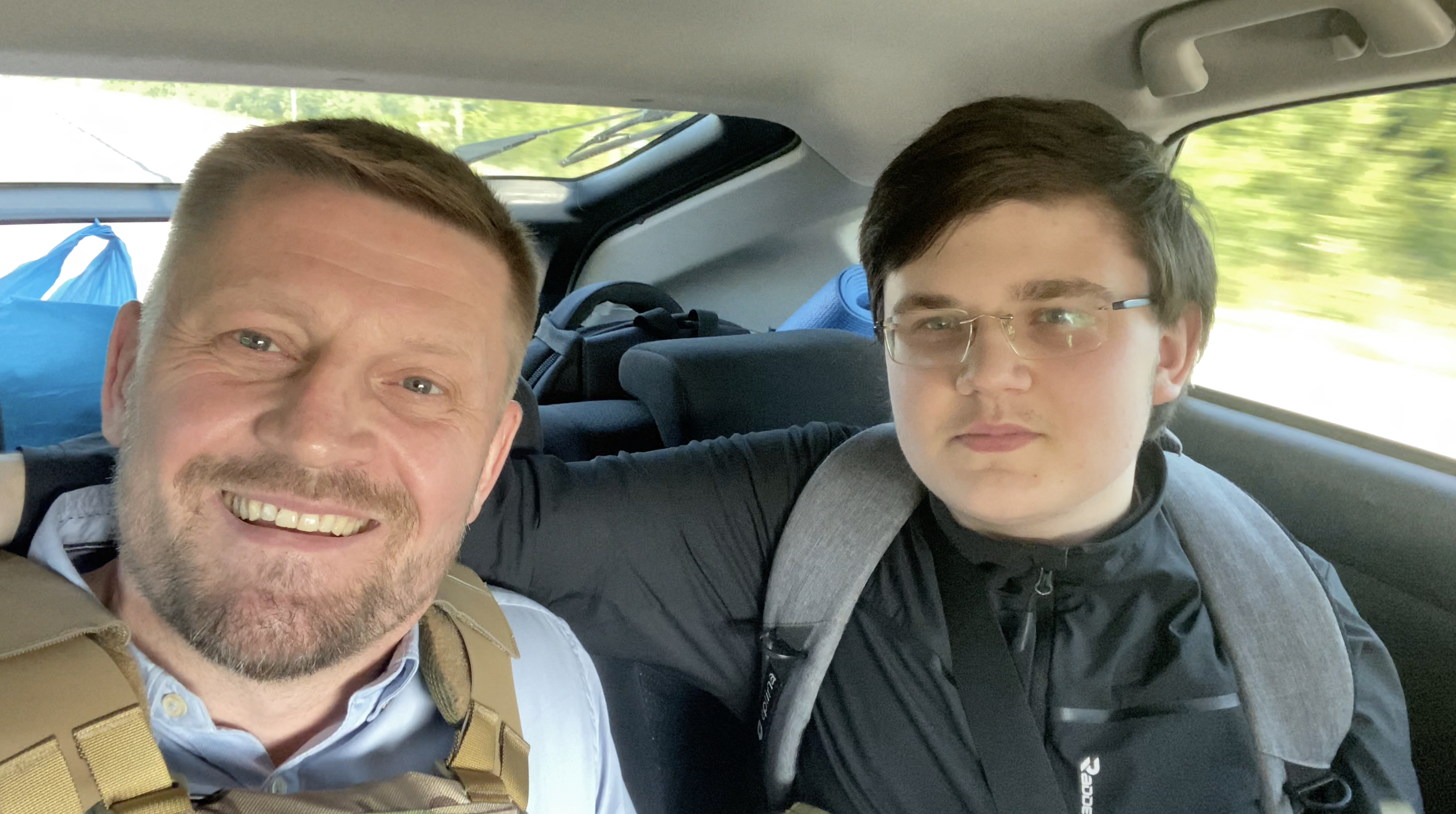Valeriia Sydorova was 16 years old and living “like any other teenager” when Russia launched its full-scale invasion of Ukraine in February 2022. Sydorova’s mother had died in 2019 and, with her father working away in another region of Ukraine, she lived with her grandparents in Nova Kakhovka, in the Kherson region in the country’s south. She enjoyed gymnastics and dancing and was hoping, after school, to move to the capital, Kyiv, to study nursing.
She recalls the confusion when explosions first shook her city, followed by tanks rolling through the streets with “Z” marked on the sides. “We did not know what troops they were. Were these enemies or our guys?” she says. When the troops raised the Russian flag over the city hall and local hydroelectric power plant, the confusion ended.
Anxious and terrified, for ten days Sydorova refused to eat or brush her hair. She jumped, startled, at every new explosion and was struggling emotionally. “There was no feeling of safety, just ongoing fear,” she says. Shops quickly ran empty of supplies. “And food became the priority — survival and food.”
The aftermath of a Russian bomb attack in Kherson
GETTY IMAGES
With missiles hitting the city daily, in October 2022, at a meeting in the main square, the occupying troops announced a compulsory and urgent “evacuation” of all schoolchildren and college students aged between 5 and 19. Parents — and in Sydorova’s case grandparents — were told they would be taken to Crimea for two weeks only, for safety.
Was she frightened? “Yes, of course,” Sydorova says. “But we did not have a choice. You could not walk around the city full of Russian soldiers. They left us no option.”
The occupying forces filled 12 buses with children from the city’s schools and colleges, the convoy escorted by military police. “Their goal was to take all the kids out of the city. And they succeeded. There are almost no kids left in Nova Kakhovka now,” Sydorova says.
• Russia ‘forcing Ukraine children into re-education and arms production’
At Camp Luchistyi — a former summer camp in Yevpatoria, Crimea — the 400 children slept in bunk beds in dormitories. The supposed two weeks came and went with, Sydorova says, the teachers who arrived with them acting as supervisors. After those two weeks, however, their teachers were told to pack and sent back to the city.
A new regime took charge. Each day began with the Russian national anthem before lessons, including what Sydorova calls “pseudo-history. They twisted the facts, claiming that the Chernobyl disaster was an artifice, that there was no Holodomor [the mass famine that struck Ukraine in 1932-33, engineered by Stalin, killing an estimated four million Ukrainians] and that Russia is the greatest nation for having defeated Napoleon.”
Captive children were made to raise the Russian flag and “march around like young pioneers, wearing red scarves”
EVA PENTEL FOR THE TIMES MAGAZINE. HAIR AND MAKE-UP: CAROL SULLIVAN AT ARLINGTON ARTISTS USING ERBORIAN KOREAN SKINCARE
They were made to take turns raising the Russian flag, “march around like young pioneers, wearing red scarves”, and speak Russian. The Ukrainian language was suppressed and those speaking it were punished.
“The camp was like a cage,” Sydorova says, complete with armed guards and surveillance cameras; those who tried to escape could not get far anyway, as all their documents had been confiscated on arrival.
A systematic re-education programme
In February 2023, Yale School of Public Health’s Humanitarian Research Lab (HRL) identified a network of at least 43 re-education and adoption facilities, 41 of which were pre-existing summer camps in Russian-occupied Crimea and Russia.
According to the HRL’s report, the primary purpose of the camps appeared to be political re-education: at least 32 of them “appeared engaged in systematic re-education efforts that expose children from Ukraine to Russia-centric academic, cultural, patriotic and/or military education.”
And far from being secretive sites, journalists and high-ranking local officials, including Vladimir Saldo, the Russian-installed governor of the Kherson region, were regularly brought on tours of Camp Luchistyi, “to show them how successful the programme was and how busy and happy we all were”, Sydorova says wryly. There was an upside to becoming animals in the re-education zoo, though. “When the journalists came, that was the only time that we would be fed well,” Sydorova adds. “All other days the food was inedible.”
• Read the latest about the Russia-Ukraine war
As Ukraine’s first lady, Olena Zelenska, wrote to Melania Trump — in a letter handed by her husband to President Trump on his visit to the White House in August — about 19,500 Ukrainian children have been forcibly removed, abducted or deported from their homes to Russia or occupied territories since February 2022, with only about 1,500 so far brought home. The return of children is part of Ukraine’s position in peace negotiations with Russia.
Olena Zelenska, third from right, meeting children returned from Russian captivity including Sydorova, second right, at the Child Rights Protection Center in Kyiv
And yet that same month it was reported that Russian-installed authorities in Ukraine’s occupied Luhansk region had created an online “catalogue” of Ukrainian children, offering them for adoption via the department for education. The database reportedly includes 294 children, categorised to enable users to search by age and gender as well as eye and hair colour.
‘Putin is trying to create a sort of Hitler Youth movement’
Now 19, with long dark hair and a watchful manner, Sydorova is one of eight young Ukrainians whose stories are told in Children in the Fire, a new documentary directed by Evgeny Afineevsky, a Russian-born, US-based film-maker whose previous works include Cries from Syria, about the Syrian civil war, and the Oscar-nominated Winter on Fire, which covered the 2013-14 Euromaidan protests in Ukraine. Along with horrifying stories of abduction and forced adoption, the new film also features children who have endured extensive burns, injuries and amputations since February 2022.
I meet two young survivors and the director in London ahead of a screening of the film in the House of Commons and days after the UK announces sanctions on “actors forcibly deporting, indoctrinating and militarising Ukrainian children”. It named eight individuals and three organisations affiliated with the Russian state, including Aymani Nesievna Kadyrova, president of the Akhmat Kadyrov Foundation, which runs re-education programmes for Ukrainian children, and Valery Maiorov, the head of Teenage Programs Centre, a state-funded organisation that aims to turn children in Ukraine’s occupied territories into Russian patriots. “You, the UK, are leading the way and setting a great example in sanctioning those who are supporting Putin’s strategy,” Afineevsky says. “And it is a strategy.” The film includes footage of Putin stating that, “Wars are not won by generals, but rather by schoolteachers and priests.”
“He is saying that re-education is the key element of winning the war. And it applies not only to Ukrainian kids; it applies to the entirety of Russia. He is trying to create a sort of Hitler Youth movement.”
Russian servicemen in Melitopol
GETTY IMAGES
‘I could not tolerate people around me speaking Russian’
Two months into her captivity at Camp Luchistyi, Sydorova was released back into the care of her grandparents. She was permitted to return only to the occupied territories, not to Ukraine.
But in occupied Henichesk, back in the Kherson region with her grandmother, there was little relief. “I could not tolerate all the people around me speaking Russian,” Sydorova says. “Because Russian was the language of the people in the camp and, in my mind, was a synonym for danger.”
Eventually, in August 2023, she left Henichesk and made her way to Ukraine, a journey involving car rides with strangers, navigating countless military checkpoints, and a two-hour walk through a minefield.
Sydorova is now in her final year of nursing training in Kyiv, has a boyfriend and lives in the city with other students. She is even comfortable hearing Russian spoken now.
But the months in the camp have changed her. “Before, I was very sociable. Now, in a new environment, a new job, a new group of people, it takes time to get acquainted and to get comfortable, to trust people.” She has chronic stress disorder but sees a psychologist weekly, and believes the therapy she has received— free and easily available for young people in Ukraine, she says — has been invaluable. “Nobody will leave you to face your problems alone. It is a big advantage.”
Vladislav Buryak, 20. He was was kidnapped at 16 and made to clean torture cells
EVA PENTEL FOR THE TIMES MAGAZINE
Witness to brutality
When Russian troops arrived in Melitopol, in the Zaporizhzhia region of southern Ukraine, Vladislav Buryak’s mother and sister quickly left for Europe. His father, Oleg, a local government administrator, was working in Zaporizhzhia city. Buryak, then 16, stayed in Melitopol to help his grandparents and care for the family’s pets.
In early April, however, with the city heavily occupied, his father arranged for him to join him in Zaporizhzhia, travelling in a convoy of private cars. While driving through the town of Vasylivka, the convoy was stopped at a checkpoint and a Russian soldier ordered Buryak to hand over his documents and phone. Visible on his screen was the Telegram app, showing videos of Russian soldiers who had been taken prisoner, seemingly stating they didn’t want to fight this war, didn’t believe in it and wanted to go home.
Buryak was ordered out of the car at gunpoint, and “taken to a backyard, where I waited for two or three hours under guard before I was put in a military truck”.
His journey eventually ended at a police station, where Buryak would be kept prisoner for the next 48 days.
Now 20 years old, with strong, confident English (he also speaks Russian and Polish), a result of having now lived in the UK for almost three years with his mother and sister, he is fearsomely industrious. He has multiple jobs and aims to move to Poland to study diplomacy or government relations.
But he is also cautious, choosing his words carefully when relating the context of his kidnapping and subsequent ordeal.
Buryak with Volodymyr Zelensky at the Ukraine peace summit in Switzerland last year
While he says his was a case of “the wrong time, wrong place and wrong occasion”, he also believes he was a hostage, deliberately taken to be used in exchange for a Russian prisoner. He has, he says, “a more clear story”, involving a particular person, which he cannot tell for his own safety. “Russians have huge power. Remember how Russians killed two or three British people here?” he notes.
And Buryak has good reason to be wary, having witnessed Russian brutality on an almost unimaginable scale.
At the police station, he was placed in a small cell measuring just 3 x 2 metres. It was seven days before he was allowed to make a phone call — of less than two minutes to his father — and two weeks before he was allowed to take a shower.
There were, he recalls, about 30 people at the station; almost all appeared to have been tortured. In three other cells, on an almost daily basis these detainees would be beaten heavily.
‘My brain started to erase childhood memories’
Buryak recalls a particular method favoured by the Russian guards involving a traditional telephone with its wires connected to electrical charges. If the prisoner let go of the wires, they would be beaten. If that wasn’t brutal enough, two needles attached to the wires would be stuck under the victim’s fingernails and the electric current switched on.
“They also used sexual violence,” Buryak says. One man he met had four ribs broken, three fingers hacked off and was sexually assaulted with a mop handle.
While Buryak was spared the torture he was forced to witness, he was made to clean the torture cells, washing the blood away. He recalls finding a middle-aged man in one cell hanging from the ceiling with a bucket full of blood underneath him. “His face had been so badly bruised and distorted by torture.” His features were no longer even recognisable, Buryak says.
He was also, briefly, made to share his cell with a young man who had been tortured for two days straight. He tried to hang himself and, when that didn’t work, took the lid off a tin can and used it to open his veins. After his body was taken from their cell, Buryak had to clean up the mixture of blood and urine that covered the walls and floor. The smell, he says, “lingered in my nose and throat for a long time. It took me three or four months to get rid of it after my liberation.”
Buryak witth his father, Oleg, back in Ukraine after his release
The psychological impacts were severe. Buryak believes he lost about eight to ten years of memories in captivity. “My brain started to erase childhood memories. Your brain switches into survival mode.”
In late May, Buryak was abruptly transferred to a hotel in Melitopol. “I was still a prisoner,” he says, “but it was a much better situation. I could wash myself when I wanted. I could use my phone.”
He called his father on arrival at the hotel. “He said that I had lost my normal voice. It was now metallic, non-emotional. I no longer sounded like a real person.”
On July 7, again with no warning or explanation, Buryak was taken from the hotel, driven to the furthest Russian checkpoint in the city of Vasylivka, put in a civilian van and driven to Zaporizhzhia, where he was reunited with his father.
It was, he says, a cautious and muted reunion. “We understood that we were together, but it was very confusing,” he admits. “Our brains had been working very hard to control our emotions… My father and I, we understood that we could hug each other, that it was over, but it took us a while to adapt.
Children in the Fire director Evgeny Afineevsky
EVA PENTEL FOR THE TIMES MAGAZINE
“It’s been a long time since I’ve really felt free,” he continues. Even after his time living in the UK, “I am scared that it could happen again.” Unlike Sydorova, he has not seen a therapist. “Yeah, that was a mistake,” he admits. “But it’s too late. The time is already gone, and I have so many things I need to do.”
He is keen to begin his studies, so he can help prevent the sort of ordeal he went through happening to others.
“I don’t want peace only for my country; I want peace in the whole world,” he says. “I want to prevent terrorism attacks. I want to prevent kidnapping children. I want to create something that can really protect the world. Because right now terrorist countries can do whatever they want — and they mostly won’t receive any punishments or penalties.”
